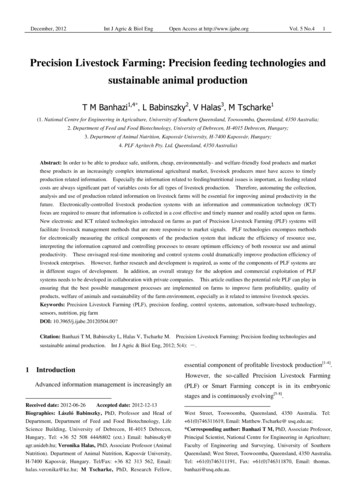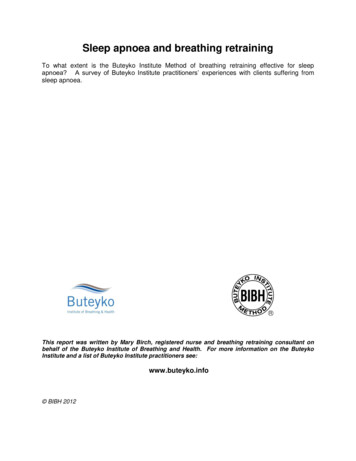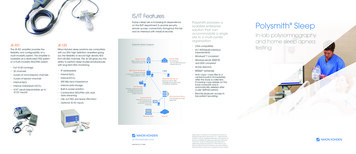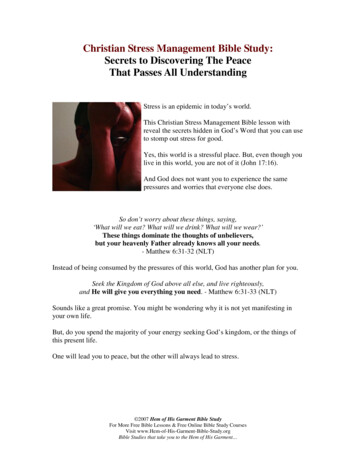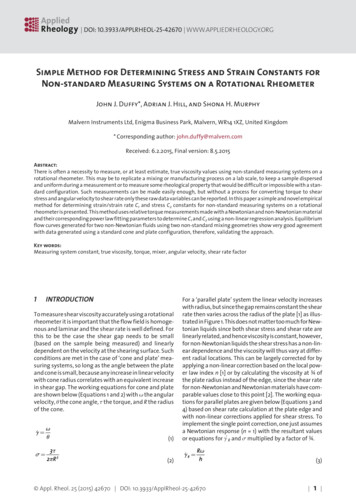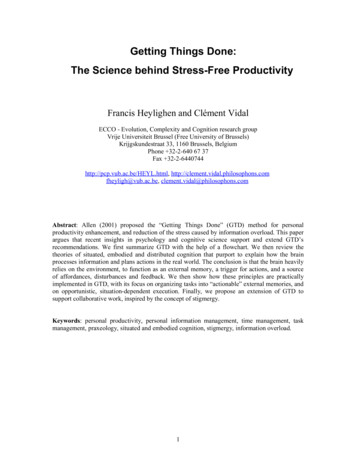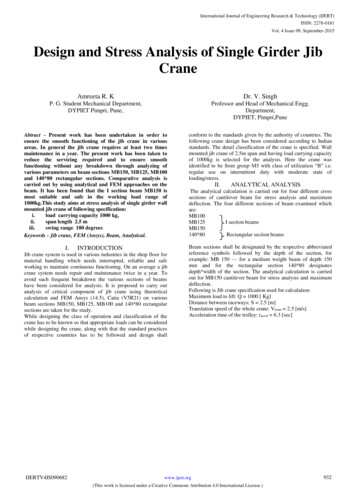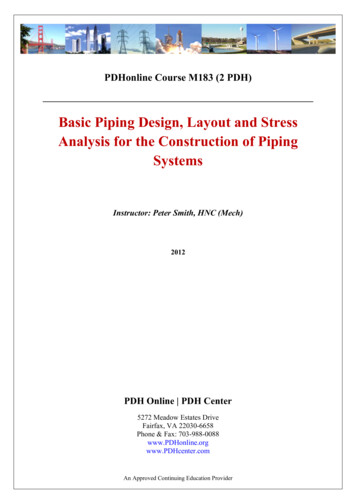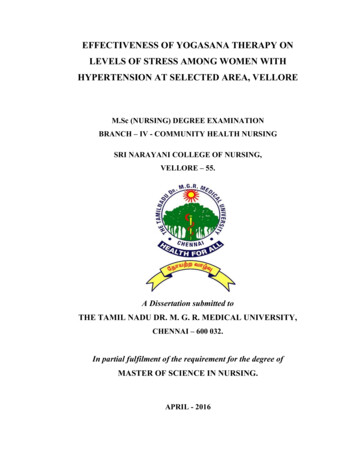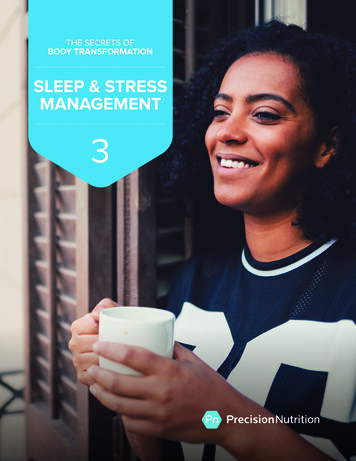
Transcription
THE SECRETS OFBODY TRANSFORMATIONSLEEP & STRESSMANAGEMENT3
THE SECRETS OF BODY TRANSFORMATIONLESSON #3SLEEP & STRESSMANAGEMENT01HACKING SLEEP:ENGINEERING A HIGH QUALITY, RESTFUL NIGHT.02THE POWER OF SLEEP. [INFOGRAPHIC]WHY SLEEP IS SO IMPORTANT, AND HOW TO GET MORE OF IT.03GOOD STRESS, BAD STRESS:HERE’S HOW TO FIND YOUR SWEET SPOT.04GOOD STRESS, BAD STRESS. [INFOGRAPHIC]USING GOOD STRESS TO REACH YOUR GOALS.05FITNESS PLANNING FOR STRESSFUL TIMES.LESSONS FROM OUR PRECISION NUTRITION COACHES.
HACKING SLEEP:Engineering a high quality, restful night.By Brian St. PierreIn case you haven’t heard, sleep is absolutely crucial to your health.With a few simple strategies, you can get the high-quality, restfulsleep your body and your mind deserves.
Sleep is just as important as nutrition and exercise when it comes toimproving your health, performance, and body composition.Good sleep helps our bodies and minds recover, keeping us lean,happy, mentally focused, and healthy.But chronically bad sleep slathers on body fat, screws up ourhormones, ages us faster, increases chronic illnesses, and drains ourIQ and mojo.Fortunately, research also shows that returning to adequate sleep canquickly reduce these risks.So how do we go about getting that replenishing shut-eye?Create a sleep routineJust like you can’t go from 0 to 100 first thing in the morning, you can’tdo the reverse at night — going from “on” to “off” in a few minutes.Your body needs transition time and environmental cues to winddown.Thus, the first step to getting more and better sleep is to create anighttime routine that tells your body that you are preparing to go tosleep. Over time, if you’re consistent, your body will start the processof gearing down automatically.Keep a regular schedule.Our bodies like regularity. Try to go to bed and wake up at the sametime every day and night. While it might be unrealistic to do this sevendays a week — especially if you have young children, like I do — try tobe as consistent as possible.The Secrets of Body Transformation Day 3: Sleep & Stress Managementprecisionnutrition.com
If you’re consistent, your body will know when to release calminghormones before bed, and stimulating hormones to help youwake up. You’ll feel sleepy when it’s time for bed and wake up morerefreshed, often without needing an alarm.Keep alcohol and caffeine moderate.Genuinely restful and restorative sleep comes from deep sleep.Even though it seems like booze is relaxing, more than 1-2 drinks inthe evening can interfere with deep sleep, as can too much caffeine.So limit alcohol to the suggested amounts, and reduce caffeine after 2 pm.Otherwise, although you may “sleep” for 7 hours, your sleep won’t behigh quality, and you won’t get the recovery benefits.Eat and drink appropriately.Having a large meal immediately before bed can disrupt your abilityto fall and stay asleep. Instead, eat a regular-sized (or even smallish)meal a few hours before bedtime.A nice blend of protein, carbs and fats will help to keep you satiated,and might even improve your ability to fall asleep as your brainconverts carbs to serotonin.In addition, try to limit your fluids 2-3 hours before bedtime. Drinkingtoo much liquid shortly before bed can result in frequent waking forbathroom breaks.While total sleep time is important, uninterrupted sleep time is even better.The Secrets of Body Transformation Day 3: Sleep & Stress Managementprecisionnutrition.com
Do a brain dump.We’ve all done it: Stared at the ceiling, long after lights-out, obsessingabout all the things we’re supposed to do tomorrow, tossing andturning and getting more and more stressed by the minute.Try this instead: In the evening, take a few minutes to write out a list ofwhatever’s bugging you: Emails you need to send or reply to, calls youhave to make, project ideas, creative thoughts, that thing you shouldhave said to so-and-so Whatever is in your brain, get it out and on paper.Around here we call this a “brain dump.” It clears your mind forgenuine relaxation.Turn off electronics.Digital devices stimulate our brain with their light, noise, and mentaldemands.Unplug from all screens — TVs, computers, phones, tablets — at least30 minutes before bed.(If you must read your tablet, switch the screen to the black or dimmerbackground. And if you’re going to be on your computer, download aprogram like f.lux, which decreases your screen’s color temperature atnight.)Our brain produces melatonin as light levels decrease. Melatoninensures deep sleep, and may also help regulate our metabolism.If we have too much light at night, we don’t get proper melatoninproduction.The Secrets of Body Transformation Day 3: Sleep & Stress Managementprecisionnutrition.com
Stretch / read / de-stress before bed.What de-stresses you? Do that.This could include: Gentle movement — such as stretching or yoga, or even a slowstroll around the block. Even 5-15 minutes can release tensionand activate calm-down chemicals. Reading before bed — but make sure it’s not too engaging— otherwise you’ll be tempted to stay up with that thrillingdetective novel until the wee hours. Meditation, deep breathing, or other simple relaxationexercisesGo to bed before midnight.Interesting factoid: According to some sleep experts, because of theway our natural circadian rhythms work, every hour of sleep beforemidnight is worth two hours after.(Whether that’s true or not, or whether it’s even measurable, I’m notsure. But I’ve heard it repeated so often by sleep experts it’s probablyworth consideration.)According to these experts, we’re meant to go to sleep when it getsdark, and to wake when it gets light. That old saying about early tobed and early to rise still stands the test of time.The Secrets of Body Transformation Day 3: Sleep & Stress Managementprecisionnutrition.com
Sleep at least seven hours.Most people need 7-9 hours of sleep per night. 7 should be yourbaseline. If you know you have to wake at 5:15 to get ready for work,then you should be in bed by 9:30 and asleep by 10. Getting in bed at10:15 doesn’t count.Also factor in transition time. Don’t stop what you’re doing at 9:29 andexpect to be snoring by 9:30. Start moving in the direction of bed by9:00.Yes, we know. There’s this whole movement, started by time-starvedSilicon Valley executives, where folks try to “hack” their sleep and getaway with much less.And, sure, it can work for a while. But every piece of credible researchdemonstrates that you pay a big health (and productivity) price forconsistently getting less than 7-9 hours.Exercise regularly.Exercising regularly helps normalize circadian rhythms, tone down thesympathetic nervous system, and regulate endocrine function.However, save the intense exercise for during the day if possible — aweights or interval workout in the evening can rev us up and make ittougher to get to sleep.The Secrets of Body Transformation Day 3: Sleep & Stress Managementprecisionnutrition.com
Take a bath or shower.While not everyone likes to shower or bathe at night, warm waterbefore bed can help us relax and de-stress, which is key for fallingasleep. If you go the warm water route, throw in some magnesiumbased epsom salts as magnesium is known to help with sleep.Some brave souls — including JB — swear by cold water inthe evening. The logic is that cold water stimulates a strongparasympathetic nervous system response once the initial shock haspassed. A short, very cold shower will do the trick.Give it a try, and see which works better for you.Optimizing your sleep environmentIn addition to creating a nightly sleep routine, to help improve yoursleep quality and duration, you should ensure that your sleepingenvironment is actually conducive to sleep.A few small adjustments can make a big difference here.Keep the room as dark as possible.Melatonin is a hormone produced by your brain that signals to yourbody it is time for sleep. Making your room as dark as possible willmaximize your melatonin production.Meanwhile, light — particularly blue light, which most electronicsproduce — inhibits melatonin production and makes it harder to falland stay asleep. (Sunsets produce red light.)The Secrets of Body Transformation Day 3: Sleep & Stress Managementprecisionnutrition.com
So how can you limit light exposure? Dim lights at night. Install low-wattage bulbs in your bedroom,and keep things as dim as possible in the hour before yourplanned bedtime. Cover your windows well. (Maybe time to upgrade from thecruddy IKEA Venetian blinds you’ve had since undergrad?) Use a motion-sensitive or dim night light if you needsomething to illuminate your midnight path to the bathroom. Put your iPhone in another room or flip it face down. Cover or dim the alarm clock, or look for one that illuminatesonly when touched. Again, if you have to use a computer late at night, downloadthe software f.lux, which changes the brightness and tone ofyour screen in time with sunset and sunrise, reducing eveningblue light.Create a relaxing sleep area that is quiet and free of clutter.Your bedroom should be relatively organized and peaceful.The sight of clothes strewn all over the floor or furniture, boxes orbooks toppling over, and tangled cords can make you feel stressedand interfere with your ability to relax.A messy room can also be dangerous if you have to get up at night touse the bathroom.The Secrets of Body Transformation Day 3: Sleep & Stress Managementprecisionnutrition.com
Set your room to an appropriate temperature.Most people sleep better when it’s cool (around 67 F); others sleepbetter at a neutral temperature.Find what works best for you and do your best to regulate yourbedroom to that temperature each night.Use white noise if needed.If you live in an urban environment and you tend to pop awake at theslightest sound, then a steady source of white noise could really help.Using some nature sounds on your iPhone, or even just turning on afan (or an old radio to static) can be enough to drown out other noisesand lull you to sleep.A HEPA filter can also work well for this purpose, serving double dutyby keeping your air cleaner as well.How to wake upThink of sleep as something that begins the moment you wake up. Inother words, what you do during the day will affect what happens thatnight. So let’s look at how to wake up.While a jarring alarm will certainly get us out of bed, it doesn’t exactlystart the day on an enjoyable note. Not only that, it jacks up our stresshormones immediately, starting our day in “fight or flight” mode.Here are some more humane solutions.The Secrets of Body Transformation Day 3: Sleep & Stress Managementprecisionnutrition.com
Take advantage of natural rhythms.Sleep occurs in multiple stages, alternating between deeper andlighter sleep. We sleep more and more lightly as the night goes on.If we wake up at just the right moment in our lighter sleep stages, we’llfeel reasonably good and snap into alertness quickly.But if we’re forced to wake up while in a deep sleep phase, we’ll feelgroggy, disoriented, and sleepy — suffering from sleep inertia.There are many gadgets and apps that will sense your sleep cyclesand wake you up when you’re sleeping your lightest.For example, the iPhone SleepCycle app or SleepBot will wake you upwithin a pre-specified time window when it senses your wakefulness.You can also track your sleep with gadgets and apps like Zeo or theFitbit, which will help you gauge where to improve your sleep andwake routines.Wake up to light.The human body is designed to get sleepy when it’s dark and to wakewhen it is light.However, it is not always feasible to wake up with the sun, and this isespecially true if you use light blocking shades to keep your room asdark as possible.The Secrets of Body Transformation Day 3: Sleep & Stress Managementprecisionnutrition.com
Solution: Use a dawn-simulating alarm clock.Research shows that when people are slowly roused by graduallyincreasing light levels, they feel much more alert and relaxed thanwhen they’re woken up by a sudden, blaring alarm.I personally use and love my Biobrite, as it slowly lights up my room,reaching maximum brightness at my wake time.Increasing light has also been shown to raise cortisol in the morning(which is an important signal to your body to wake up), and to improvesleep quality. It can even decrease depressive symptoms in seasonalaffective disorders.Wake up to soft, slowly building noise.Some types of alarm clocks (such as the Progressive Alarm Clock app)will also gradually increase noise or music, so that you’re slowly liftedout of sleep rather than being suddenly whacked in the ear with aloud morning DJ.Get moving right away.While I don’t have any research to support this argument, I believeit helps to put your feet on the floor the minute you wake up. It’s arecommendation I borrowed from Mike Boyle, a Godfather in thestrength and conditioning world, and it’s worked tremendously wellfor my clients and me.When your alarm goes off, one of the worst things you can do is hitsnooze. Snoozing seems to increase sleep inertia.Instead, once that alarm goes off, simply sit up and put your feet onthe floor. Start shambling towards the bathroom, or anywhere else thatisn’t your bed.The Secrets of Body Transformation Day 3: Sleep & Stress Managementprecisionnutrition.com
There is something magical about movement that seems to speedup the waking process.Expose yourself to more light.Whether you wake to a dawn-simulating alarm clock or not, continueto expose yourself to light as soon as possible after waking. This willstop melatonin production and increase your wakefulness.Throughout the day, get as much light as you can. Most folks cansneak outside for 5-10 minutes. Run errands at lunch or eat outside.Do as much as you can to get that sunshine.The more bright natural light you can get during your normal wakingtime, the more your body will know to gear down at your normalsleep
wake up. You’ll feel sleepy when it’s time for bed and wake up more refreshed, often without needing an alarm. Keep alcohol and caffeine moderate. Genuinely restful and restorative sleep comes from deep sleep. Even though it seems like booze is relaxing, more than 1-2 drinks in the evening can interfere with deep sleep, as can too much .
